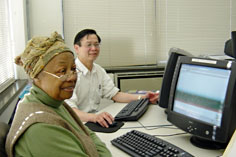South End Center pushes education beyond the classroom
Dan Devine
The story, as Al Whitaker tells it, is that the South End Center for Adult Education was started in the fall of 2003 when United South End Settlements (USES) identified “a need in the community.”
“The South End is such an amazingly diverse place — you can live on a street where a CEO lives right next door to you and not even really know it,” said Whitaker, the center’s manager. “So our goal, and the impetus behind the South End Center, was to create a place where you can come, take classes together, see shows and events, and really get to know your neighbors and fellow members of the community.”
When asked what sets the South End Center apart from adult education programs in other parts of the city, Whitaker continually comes back to those sorts of phrases: “bringing together neighbors,” “improving community relationships,” “encouraging the growth of the individual.” The focus on the classroom is important, but it’s the commitment to community building that so energizes Whitaker and informs the Center’s mission.
The Center’s mission makes sense given its location. South End Center operates out of USES’ Harriet Tubman House at 566 Columbus Avenue, an address with a serendipitous geographical feature — it’s where the South End, Roxbury, the Fenway and Back Bay all intersect, bringing together Bostonians from a vast array of races, ethnicities, income levels, lifestyles and ages. That eclectic makeup is reflected in the Center’s enrollment.
“[Students in] the Center for Adult Education range anywhere from 19 years of age all the way up to 65 … It really runs the whole gamut,” Whitaker said.
To tap into a community with such wide-ranging demographics, you need to offer a pretty broad spectrum of services — something Whitaker says the South End Center is working on.
“We have a variety of classes, including a language section that offers Arabic, Japanese, Chinese, Spanish, Italian and French. We offer a course in bellydancing, a course in Photoshop,” and a host of other educational opportunities, Whitaker said.
Whitaker knows there’s more to building a community than just holding classes that tap into residents’ New Years’ resolutions to branch out and try something new. He noted that USES offers educational programs and enrichment activities for all ages, including early childhood education, after-school programs and summer day camps for kids, GED preparation, basic literacy, civic engagement initiatives, technological education and computer learning courses for adults, and even services and pursuits designed specifically for seniors.
For those more interested in nuts and bolts issues of how to get something positive started in their own neighborhoods and for their own portfolios, Whitaker is planning to develop an entrepreneurial center this fall, which he said will deal with a variety of personal and professional issues like increasing citizens’ financial literacy and instructional courses on how to start a small business.
But it’s also important to focus on fun, and toward that end, Whitaker organizes major seasonal events that the Center hosts to coax South End residents out of their homes and bring them together.
“This is what really does the trick. People get very excited about [these events], so they come and get to know other members of the community,” said Whitaker.
Whitaker has two popular events from the past slated for a return on this spring’s schedule. In April, the Center will once again host “Urban Verbal Stew,” a night of local literature that sees some of Boston’s progressive writers reading from their works. The energetic Whitaker called the reading “fantastic, because the diversity of participants there is just off the charts.”
The Center’s second seasonal event, “Breathing Stones,” opens with a May 2 reception. The exhibit of stone sculpture from Zimbabwe — which USES hosts in conjunction with Planet Aid, a nonprofit organization dedicated to environmental protection and improving the lives of people in developing countries — drew great interest last year, according to Whitaker, because it brought art some might have considered inaccessible right to the fingertips of South End residents.
“The event gives people the chance to see affordable pieces of art that people can not only look at and buy, but you can get right up there and touch them,” Whitaker said. “One of the comments we got frequently last year was that this is the kind of art you see on Newbury Street, and here it was, right in the South End — and it was at a good price, which people really enjoyed.”
As he looks to expand the South End Center’s base of services and course offerings, Whitaker welcomes ideas, proposals and suggestions from community members via e-mail at awhitaker@uses.org. For more information about the Center and other United South End Settlements services, call 617-536-8610.
|
| Ruth Carrington (left) and Cheuck Woo (right) learn new skills in the Introduction to Computer class at The South End Center for Adult Education, a program operated by United South End Settlements. (Photo courtesy of United South End Settlements) |
|


